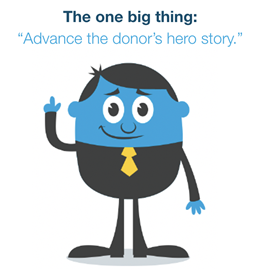We use cookies to ensure that we give you the best experience on our website. By continuing to use this site, you agree to our use of cookies in accordance with our Privacy Policy.
 Login
Login
Your Role
Challenges You Face
results
Learn
Resources
Company
Why Listening and Investigating Matter So Much for Funding Your Mission


You might want to check out the first post in this series before reading this one.
In that post, I told you that telling is not selling. I also emphasized that storytelling can’t motivate and inspire massive giving. It might help generate transactional, low-dollar gifts, but those donors don’t retain.
In fact, in 2021, my Fundraising Report Card Benchmarks found that new low-dollar retention dropped to 16.35%. Fewer than one in five new donors giving under $100 gave the following year. Meanwhile, new donors giving over $5,000 retained and gave at more than twice the rate (35.73%).
You might also want to go here and here to read the other posts in this series. Then you’ll understand how I think storytelling matters and how it doesn’t.
Today’s post is about what matters more — listening — and the order of storytelling and listening.
Storytelling is only part of the equation.
Spoiler alert: it’s the least important part.
Absent listening and investigation, storytelling won’t drive enough giving to make a difference for your organization. That’s because storytelling is an arm’s-length, one-size-fits-all strategy. It’s used in spray-and-pray, transactional fundraising approaches that fail to seriously move the needle.
Listening and investigating must come first.
Make no mistake. Storytelling is not bad. It helps to elicit emotion and foster prosocial behavior.
However, if you want wealthy people to give — especially the 3% who supply 85% of the donation dollars — you need to tell stories in ways that help advance each donor’s individual hero story. Then they’ll exhibit prosocial behaviors and they’ll feel motivated to make massive donations.
The lesson here involves listening and investigating first so you can have a shot at customizing your storytelling so it becomes hyper-relevant to your audience.
The more relevant your story is, the more it will resonate, motivate and inspire.
You can make your story relevant if you listen first.
When storytelling is absent, ‘storylistening’ your audience might feel some emotion, and some might give. But absent relevance that resonates for each individual supporter, the motivation to act will be muted.
Conversely, when ‘storylistening’ and investigating comes before storytelling, fundraising works better.
INVESTIGATING
+ STORYLISTENING
= CUSTOMIZED, PERSONALIZED, MOTIVATIONAL STORYTELLING
It’s about advancing your supporters’ hero stories, not your organization’s.
According to Dr. Russell James, that’s “the one big thing” every fundraiser must understand. Your job is not to just tell stories. It’s to advance your donor’s hero story by first helping each individual supporter reconnect their life, their community, and their values to your cause.

With storylistening, you (and they) begin to understand how their life entwines with your mission. From there, you can uncover what might drive massive giving.
Together, you can investigate what giving opportunities might help a high-value supporter feel like a hero in their own life story. Then, you can collaborate on a giving opportunity that fits because it aligns with their story and how they want to enhance their identity (find meaning in their life).
Finally, at that point, you can tell stories that will motivate action. Usually, those stories will be about people like them who told you similar stories and found meaning in their lives through similar giving opportunities.
When you tell those stories, fundraising works. That’s how the most successful fundraisers inspire major gifts of consequence.
It’s not about you.
Raising money isn’t about telling the stories you find interesting (usually about you and your organization’s achievements). It’s about them: listening to your supporters, their lives, and how they want to find meaning.
By listening and investigating first, you can understand how an individual donor seeks to gain value so they can look themselves in the mirror each day knowing they did good here on Earth.
Armed with that kind of deep, personal information, you can align your stories with each individual donor’s story in ways that help them realize they can be the hero in their own life story — if only they were to give.
So storytelling isn’t bad or wrong. It can help support the process. But it can’t be the process.
There’s no way around it. Absent listening and investigating, stories fall short.
So be careful with storytelling.
If you spray your stories through myriad communication channels, you will convince some folks to donate. But not enough, and some will think your stories sound like brags. Others might think you don’t need more money. Most won’t be major gifts.
The bottom line is this: Storytelling on its own will never help your organization achieve its long-term fundraising objectives to secure its mission.
But when you combine storytelling with investigating and storylistening, so your stories resonate with your donors, you will.
So how do successful fundraisers use stories to inspire and motivate supporters to give?
Look out for the answer to that question in my next post.
Related Posts:
- WHAT EVERYONE GETS WRONG ABOUT STORYTELLING IN FUNDRAISING
- 4 REASONS WHY FUNDRAISERS THINK STORYTELLING MATTERS
- WHY STORIES MATTER IN FUNDRAISING
LIKE THIS BLOG POST? SHARE IT AND/OR LEAVE YOUR COMMENTS BELOW!
Get smarter with the SmartIdeas blog
Subscribe to our blog today and get actionable fundraising ideas delivered straight to your inbox!
